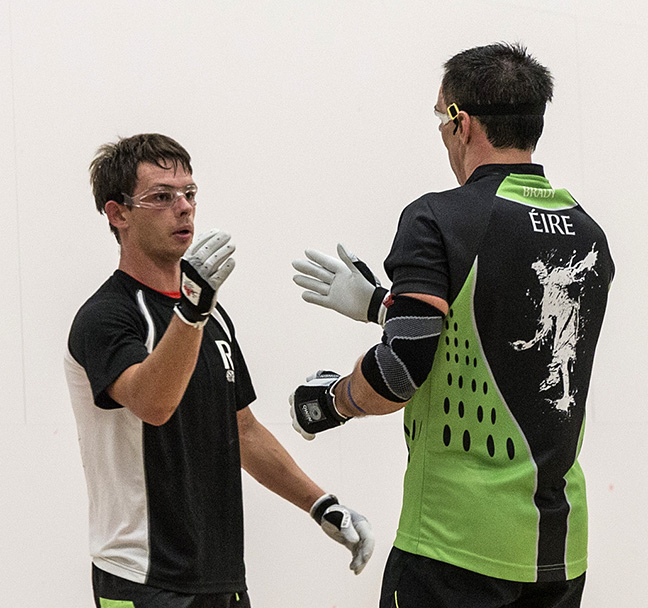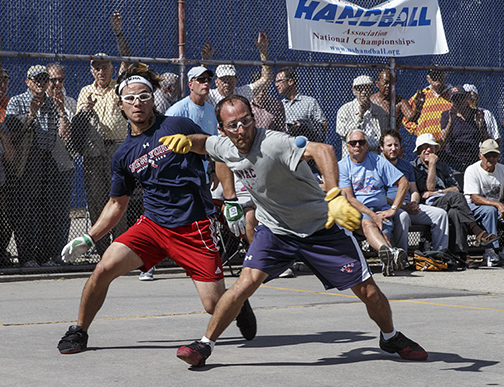Embracing the ‘Warrior’ way of Handball

A warrior will have many opponents in a lifetime, but the ultimate opponent is the warrior’s own self…To actually overcome one’s own defects is the true nature of victory.
— From “365 Tao: Daily Meditations”
Self-reflection being one of the hallmarks of wisdom, it seems wise to step back from time to time to consider the things we do and think about why we do them. One thing I wondered about recently was: Why do I play handball? And when I play, is the experience positive or negative?
Here’s what I came up with. We can all recite reasons we play the game:
- “It’s good exercise.”
- “I like the camaraderie.”
- “It’s a challenge.”
- “It’s just plain fun.”
The reasons we come up with, however, may not be the primary motivating factors that keep bringing us back to the courts. Chances are good that some reasons are subconscious, complicated motivational impulses associated with our egos, or an inchoate aggressiveness. If playing hand-ball reinforces our negative tendencies, it will likely do us more harm than good.
It may also be possible that our lack of a clear understanding of our motivation, and our failure to develop and cultivate a constructive point of view about handball, is preventing us from actually enjoying the game to the degree we could.
As I thought about it, I realized that in handball, as in practically every other activity, our attitude and our motivation will dictate whether the experience is constructive and beneficial — or destructive and harmful. I found it helpful to consider the metaphor of the warrior.
 Both Killian Carroll and Paul Brady have battled in epic finals since they Both Killian Carroll and Paul Brady have battled in epic finals since they met in at the 2015 World Championships–each often exhibiting a warrior’s characteristics. Photo by Keith Thode. |
I had recently read a discussion of the warrior metaphor in Ming-Dao’s “365 Tao,” from which I quote above, and realized that it could easily apply to handball. The sport is, after all, about as close as you can get to combat without people actually hitting each other (at least not on purpose).
The warrior is a symbol that appears in Eastern and Western cultures and religions as a person of great virtue. The good warrior is courageous, self-sacrificing and highly disciplined. As Ming-Dao points out, what’s admirable about the warrior isn’t that he defeats the enemy. Rather, it’s that he overcomes his own weaknesses.
Viewed from this perspective, the handball player who works hard at the sport while trying to reinforce his or her positive emotions is the player who will derive the most benefit. Handball, besides being something we do just to keep in shape or just to have fun, can be a discipline that improves the quality of our lives by teaching us humility and self-discipline.
So it’s helpful to ask some basic questions about our goals in playing handball. Because the game is part of our lives, it should advance our life goals.
Different people, of course, have different life goals and ambitions. Sometimes those goals are subconscious urges that we blindly pursue and, occasionally, rationalize with platitudes. Thus, we may fail to come to grips with the reality of life, and, as Thoreau observed, end up leading lives of quiet desperation.
I’m not talking about career goals or financial goals or even athletic goals. I’m referring instead to more fundamental goals, such as the goal of achieving happiness and fulfillment, or the goal of seeking out the authentic meaning of our lives. This kind of goal isn’t advanced by self-indulgence or ego gratification.
This is where the attributes of the warrior come into play. To live a satisfying life, we know but often forget that we must have self-discipline and foster in ourselves virtues of humility, compassion, courage, honesty and respect for others. If we want to enjoy handball or any other sport, we should bring these same virtues to the way we play the game and use the game to help develop and enhance them.
So I come back to the question of how and why we play handball. I suggest we attempt to play like warriors and use the game not only to have fun or get exercise but also to consciously practice the virtues of self-discipline, humility, courage, honesty and compassion.
This doesn’t mean we can’t be competitive at the same time. In fact, we’ll find that the more we suppress our egos and respect our opponents, the more fun we’ll have and the better our game will be.
 From the 2013 One-Wall Open final: Tyree Bastidas and Joe Kaplan are two champions who leave everything on the court. Photo by Keith Thode. |
We all know it’s a lot more fun to win than to lose. But if we can’t lose with grace and equanimity, we need to re-examine why we play the game — and step away from the dead-end pursuit of ego gratification.
Our real opponents are our own minds. We know that our bodies play the game much better if our minds aren’t flooded with ego-based anxiety. And if we can’t appreciate it when our opponent executes a perfect off-hand, back-wall kill shot, we’re missing out on the fun of the game.
Or if we get seriously upset at ourselves every time we miss a shot and go into depression when we lose a game, we need an attitude adjustment.
If played with the right attitude, handball rewards and reinforces virtues and qualities that make life worth living. Taking the game seriously means to work at training our minds and bodies to play the game well. In the process, we may find that the sweetest victory is victory over our own demons.
So we should play handball like warriors — fun-loving warriors, but warriors nonetheless — who never disrespect our opponents or ourselves. This just might enrich our handball experience and help make us all a little more enlightened.
